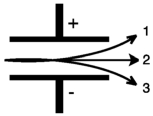B) False
Correct Answer

verified
Correct Answer
verified
Multiple Choice
Nuclear emissions are passed through a tunnel that has a positive plate on the top and a negative plate on the bottom.Which of the following emissions is deflected the greatest by the electrical field?
A) ( particles)
B) ( particles)
C) neutrons
D) ( rays)
F) A) and B)
Correct Answer

verified
Correct Answer
verified
Multiple Choice
How much of a fissionable material is required to have a self-sustaining reaction?
A) A mass of the fissionable element that is three times its atomic weight is required.
B) A mass of the fissionable element that is greater than the mass of the control rods.
C) A supercritical mass of fissionable material is required and causes branching.
D) A critical mass of fissionable material is required and varies depending on the identity of the fissionable material.
F) C) and D)
Correct Answer

verified
Correct Answer
verified
Multiple Choice
Which of the following would have the least penetrating power into matter?
A) alpha particles
B) beta particles
C) gamma rays
D) neutrons
F) A) and B)
Correct Answer

verified
Correct Answer
verified
True/False
The curie,becquerel and roentgen are all physical units of radiation.
B) False
Correct Answer

verified
Correct Answer
verified
True/False
One of the symbols for a beta particle is  .
.
B) False
Correct Answer

verified
Correct Answer
verified
Multiple Choice
The intensity of a radiation source was measured by a Geiger-Müller counter to be 236 counts per minute when the counter was place 124 ft from the source.What will be the intensity when the counter is 248 ft from the source?
A) 59.0 counts per minute
B) 236 counts per minute
C) 118 counts per minute
D) 472 counts per minute
F) A) and C)
Correct Answer

verified
Correct Answer
verified
Multiple Choice
Uranium-235,under the proper circumstances,will undergo nuclear decay releasing 3 high speed neutrons in the process.
A) The neutrons released slow down with time and are not functional.
B) The neutrons released can be used to cause fusion reactions.
C) The neutrons released can cause a chain reaction with other U-235 atoms.
D) The neutrons are recaptured by the nucleus to produce heavier atoms.
F) B) and C)
Correct Answer

verified
Correct Answer
verified
True/False
Film badges will detect only X-rays.
B) False
Correct Answer

verified
Correct Answer
verified
Multiple Choice
What characteristic is important in using radioisotope dating for very old items,such as rocks suspected to be over 100,000,000 years old?
A) The radioisotope cannot be soluble in water.
B) The radioisotope must give off light for easy measurement.
C) The radioisotope in question must decay to another radioisotope.
D) The radioisotope should have a very long half-life.
F) A) and C)
Correct Answer

verified
Correct Answer
verified
Multiple Choice
A patient undergoes external irradiation with Co-60 for treatment of cancer.Which of the following would you NOT expect to observe as a result of this type of treatment?
A) diarrhea
B) hair loss
C) bone marrow destruction
D) altered blood chemistry
F) B) and C)
Correct Answer

verified
Correct Answer
verified
Multiple Choice
Free radicals are dangerous because
A) they are found incorporated in any radioisotope,including those that can enter the body through the lungs as does radon
B) they can be taken into the body in the food eaten if that food has been grown in radioactive soil
C) they are substances that are missing some electrons and are extremely active chemically
D) All of these responses are correct.
F) C) and D)
Correct Answer

verified
Correct Answer
verified
Multiple Choice
Which of the following radioisotopes is not used as a diagnostic tracer?
A) I-131
B) Mg-24
C) Kr-81
D) Fe-59
F) B) and D)
Correct Answer

verified
Correct Answer
verified
Multiple Choice
Consider the figure below.Which form of emitted radiation would follow the path shown by the arrow labeled 1?

A) ( )
B) ( -)
C) ( )
D) ( -) .
F) A) and B)
Correct Answer

verified
Correct Answer
verified
True/False
A common use of radioisotopes is to speed up chemical reactions.
B) False
Correct Answer

verified
Correct Answer
verified
Multiple Choice
Which of the following is not a nuclear reaction?
A) fusion
B) radioactive decay
C) fission
D) redox
F) A) and C)
Correct Answer

verified
Correct Answer
verified
Multiple Choice
The term "nuclear energy" is most closely associated with which one of the following processes?
A) nuclear fusion
B) nuclear fission
C) cyclotron bombardment
D) radioactive decay
F) All of the above
Correct Answer

verified
Correct Answer
verified
Multiple Choice
What is the nature of the reactions that occur in a star?
A) They are extremely fast chemical reactions
B) They are fission reactions
C) They are a mixture of chemical & nuclear reactions
D) They are fusion reactions
F) A) and D)
Correct Answer

verified
Correct Answer
verified
Multiple Choice
There are some elements within the periodic table that do not occur in nature.One of the man-made elements is _____ .
A) Ta
B) Pt
C) Tc
D) La
F) A) and D)
Correct Answer

verified
Correct Answer
verified
True/False
Carbon-14 is only effective in dating an object up to approximately 10 half-lives.The reason is that the speed with which C-14 decays increases after 10 half-lives.
B) False
Correct Answer

verified
Correct Answer
verified
Showing 61 - 80 of 86
Related Exams